Related Research Articles

Ural Federal District is one of the eight federal districts of Russia. Its population was 12,080,523 according to the 2010 Census.

Igor Yevgenyevich Levitin is a Russian political figure, Aide to the President of the Russian Federation since September 2013, and Class 1 Active State Advisor of the Russian Federation (2013). He previously served as the Minister of Transport of the Russian Federation. He is the Chairman of Supervisory Board of the Table Tennis Federation of Russia. He is also a member of the President Advisory Council at the International Table Tennis Federation (ITTF) and president of European Table Tennis Union until March 2022 when he stepped down temporarily due to the 2022 Russian invasion of Ukraine.

The Security Council of the Russian Federation is a constitutional consultative body of the Russian president that supports the president's decision-making on national security affairs and matters of strategic interest. Composed of Russia's top state officials and heads of defence and security agencies and chaired by the president of Russia, the SCRF acts as a forum for coordinating and integrating national security policy.
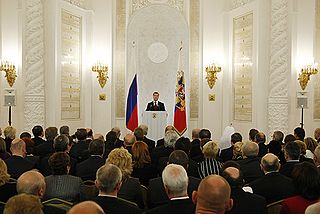
The annual Presidential Address to the Federal Assembly is a speech given by the Russian President to outline the state and condition in which Russia is in. It is given in front of a joint meeting of the two houses of the Russian Parliament: the State Duma and Federation Council. Article 84 of the current Constitution of Russia enacted in 1993 says "The President of the Russian Federation shall: address the Federal Assembly with annual messages on the situation in the country, on the guidelines of the internal and foreign policy of the State". First Russian President Boris Yeltsin delivered the first Address to the Federal Assembly on 24 February 1994. The date of the presidential address is not fixed.

Ella Aleksandrovna Pamfilova is a Russian politician, former deputy of the State Duma, candidate for president in 2000 and former chairman of the Presidential Council for Civil Society and Human Rights. On 18 March 2014 she became Russia's Commissioner for Human Rights, succeeding Vladimir Lukin. On 28 March 2016 she became the chair of the Central Election Commission.

The State Prize of the Russian Federation, officially translated in Russia as Russian Federation National Award, is a state honorary prize established in 1992 following the breakup of the Soviet Union. In 2004 the rules for selection of laureates and the status of the award were significantly changed, making them closer to such awards as the Nobel Prize or the Soviet Lenin Prize.
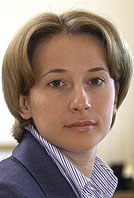
Natalya Aleksandrovna Timakova is a Russian journalist. From 2008 to 2018, she was the press secretary of Russian politician Dmitry Medvedev.
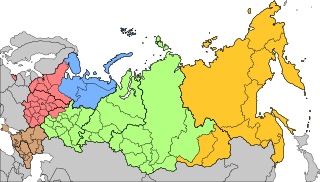
The military districts in Russia serve as administrative divisions for the Russian Armed Forces. Each district features a geographical territory based on Russia's federal subjects, and a headquarters administering the military formations based in the respective territory.

Vladimir Aleksandrovich Mau is a Russian economist, scientist, and teacher. Since 2010, he has served as the rector of the Russian Presidential Academy of National Economy and Public Administration (RANEPA). During his career, he was a member of many advisory and scientific councils and commissions. Currently, he is a member of the Presidium of the Economic Council under the President of the Russian Federation. He has a civilian service rank of the 1st class Active State Councillor of the Russian Federation.

Russian presidential elections determine who will serve as the president of Russia for the next six years.
Presidential elections are scheduled to be held in Russia in March 2024. In accordance with electoral law, the first round will be held on Sunday, 17 March. The elections will be the first after the 2020 amendments to the Constitution of Russia, and therefore the first in which incumbent President Vladimir Putin would be eligible to seek reelection. If no candidate receives more than half the vote, a second round will take place exactly three weeks later on 7 April 2024. The winner of the election is scheduled to be inaugurated on 7 May 2024.

The Commander-in-Chief of the Russian Air Force is the chief commanding authority of the Russian Air Force. He is appointed by the President of Russia. The position dates to the Russian Revolution in 1917.
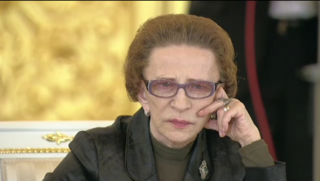
Tamara Georgievna Morshchakova is a Soviet and Russian jurist. She worked as a judge in the Russian Constitutional Court. Tamara Morshchakova was a member of the Russian Presidential Council for Civil Society and Human Rights until 2019.
State of emergency in Russia is a special legal regime that is introduced in the country or its individual regions to protect against an internal threat. The state of emergency involves restricting the rights and freedoms of citizens and legal entities, as well as imposing additional duties on them. In this case, the state of emergency, which is introduced in the case of violent unrest or clash, coup attempt, natural disaster or man-made disaster, should be distinguished from the martial law regime that is introduced in the event of external aggression.

Sergey Alimovich Melikov, is a Russian statesman and military leader, who has served as the 5th Head of the Republic of Dagestan since 14 October 2021.

Valery Igorevich Limarenko is a Russian politician. He is the current Governor of Sakhalin Oblast, a federal subject of Russia from 2018.
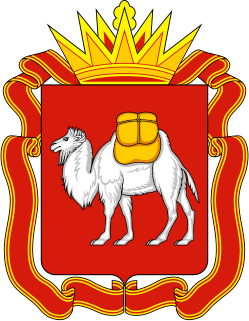
The governor of Chelyabinsk Oblast is the highest official of Chelyabinsk Oblast, a federal subject of Russia. The governor heads the executive branch in the region.
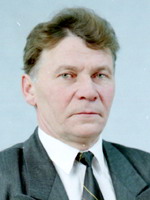
Yury Vasilyevich Belykh, is a Russian statesman who had served as the 1st Governor (Head) of Saratov Oblast from 1992 to 1996.

Vladimir Islamovich Khubiyev was a Russian politician who had served as the 1st Head of Karachay-Cherkessia from 1992 to 1999.

Vladimir Aleksandrovich Barabanov, is a Russian politician who had served as the first and fourth governor of Bryansk Oblast from 1991 to 1993 during his first term, and from 1995 to 1996 on his second term.
References
- ↑ "Presidential Councils • President of Russia". Kremlin.ru . Retrieved 2017-08-03.
- ↑ Pertsev, Andrey (2019-10-23). "Might Before Rights: Russia Shakes Up Its Human Rights Council". Carnegie Moscow Center . Retrieved 2021-08-21.
- ↑ Polovinko, Vyacheslav; Kozlova, Daria (2019-10-22). "Совет и тьма" [Council and darkness]. Novaya Gazeta (in Russian). Retrieved 2021-08-21.
- ↑ "Указ Президента Российской Федерации от 16.11.2020 № 711 «О внесении изменений в состав Совета при Президенте Российской Федерации по развитию гражданского общества и правам человека, утвержденный Указом Президента Российской Федерации от 3 декабря 2018 г. № 691»" [Decree of the President of the Russian Federation of 16 November 2020 No. 711 "On Amendments to the Composition of the Presidential Council for the Development of Civil Society and Human Rights, approved by Decree No. 691 of 3 December 2018"] (in Russian). publication.pravo.gov.ru. Retrieved 2020-11-19.
- ↑ "Президент РФ принял отставку Памфиловой" [The President of the RF accepted the resignation of Pamfilova]. Interfax (in Russian). 2010-07-30.
- ↑ "Памфиловой найден преемник" [Successor had been chosen for Pamfilova]. Interfax (in Russian). 2010-10-12.
- ↑ "Совет, возглавляемый Памфиловой, ведет себя странно" [Pamfilova-led Council is behaving strangely] (in Russian). 2009-10-09.
- ↑ Kolobrodov, Alexey (2019-10-31). "Помогал детям, и дело с концом" [He helped the children, and that's the end of it]. Culture Gazette (in Russian).